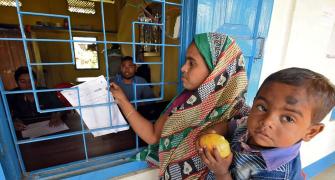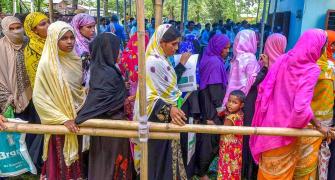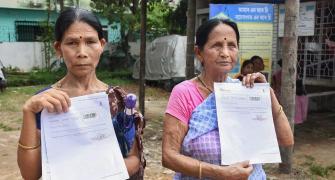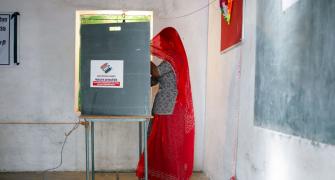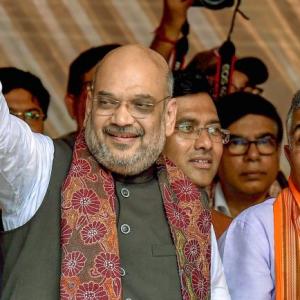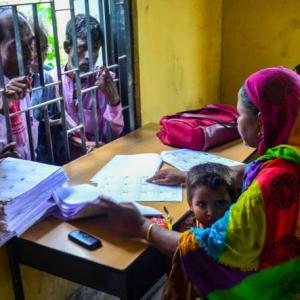'While the fears in Assam and other north eastern states are natural given their experience since 1947 when successive governments and even political leaders in Delhi repeatedly let them down, the intent and provisions under the Citizenship Amendement Bill -- when examined closely -- should remove those apprehensions,' says Nitin A Gokhale, the well-known commentator who lived in and reported from the north east between 1983 and 2006.
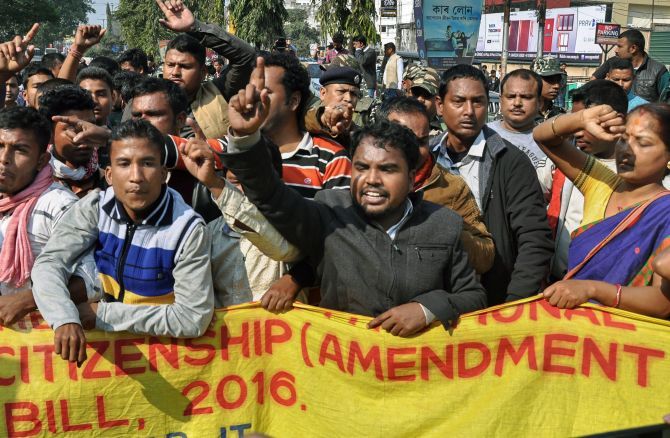
Home Minister Rajnath Singh, while introducing the Citizenship (Amendment) Bill, 2016 in the Lok Sabha, mentioned, and rightly so, that the entire country will share the burden of refugees and it will not be Assam's responsibility alone to give shelter to the persecuted minorities from Afghanistan, Pakistan and Bangladesh who came to India before 2014.
The Bill seeks to give citizenship to Hindus, Sikhs, Buddhists, Parsis, Jains and Christians on the grounds that they have been persecuted and hounded out of these three countries and in keeping with India's long-standing tradition of giving shelter to distressed people of all faiths.
This assurance came even as many political organisations and civil society in Assam are up in arms because they fear that the state will once again be burdened by the influx of millions of illegal migrants like in the past.
The Asom Gana Parishad, the regional party that was formed in the wake of the six-year anti-foreigners agitation in the early 1980s, has in fact walked out of an alliance with the Bharatiya Janata Party in the state.
Assam's neighbouring states in the north east have also witnessed protests against the Bill. Those opposed to the Bill contend that the Constitution is religion-neutral while granting citizenship and therefore this step will go against the spirit of the statute.
Certain myths associated with the Bill need to be dispelled because they are merely myths.
First up is a myth that the Bill is discriminatory against Muslims and that citizenship on the basis of religion is against the Constitution.
Since the Bill is for foreigners it is the prerogative of the Government of India to accord citizenship on the basis of its conscience. The Bill addresses only three countries (Pakistan, Bangladesh and Afghanistan) because Pakistan and Bangladesh were part of the same subcontinent and were separated from India on basis of religion.
It is no secret that the that the six identified groups of people have been tremendously persecuted and discriminated against on religious lines in these countries which is not the case with the vast Muslim majority of these countries.
If the constitution of the country embraces a specific religion as its State religion, the discrimination against the people of other faiths in that country becomes inherent.
As regards the right to equality enshrined in the Constitution, the Supreme Court has held that 'the principle of equality does not mean that every law must of universal application for all persons who are not by nature, attainment of circumstances in the same position, as the varying needs of different classes of persons often require separate treatment. It would be in expedient and incorrect to think that all laws have to be made uniformly applicable to all people in one go.'
In leading judgments, the Supreme Court held that 'the equality under Article 14 is not indiscriminate. Paradoxical as it may seem, the concept of equality permits rational or discriminating discrimination. Conferment of special benefits or protection of rights to a particular group of citizens for rational reasons is envisaged under Article 14 and is implicit in the content of equality.'
'There is no abridgement of the content of Article 14 thereby but an exposition and practical application of such contents.' What it guarantees is similarity off and not identical treatment.
The Supreme Court has repeatedly held that equal protection of law means the right to equal treatment in similar circumstances or to similarly situated people.
The Bill has been proposed in extreme humanitarian grounds as the six minorities are fleeing persecution and have no other option except coming to India illegal.
Moreover, India has had a long history of hosting victims of persecution. Be in the 12th century or more recently the Tibetans or the Tamils from Sri Lanka, India has always shown humanity and generosity in opening her arms for minority people persecuted by the majority in other nations.
And it is not for the first time that the law is being sought to be applied to the persecuted minorities trying to enter India.
As early as 1950, months after India was proclaimed a Republic, a similar law called Immigrants (Expulsion from Assam) Act, 1950 was enacted to deal with the large-scale influx from East Pakistan, spoke of treating those who felt persecuted be treated differently.
Section 2 of this Act lays down that if 'the Central Government is of the opinion that any person or class of persons, having been ordinarily resident in any place outside India, has or have, whether before or after the commencement of this Act, came into Assam and that the stay of such person or class of persons in Assam is detrimental to the interest of general public of India or any section thereof or of any Scheduled Tribe in Assam, the Central Government may by order direct such person or class of persons to remove himself or themselves from India or Assam...'
The proviso of this section is the interesting and a crucial operative part. It says '(the section) will not apply to any person who on account of civil disturbances or the fear of such disturbances in any area now forming part of Pakistan has been displaced from his place of residence in such area and who has been subsequently residing in Assam.'
The situation since then in Pakistan and later in Bangladesh has forced lakhs of Hindus to migrate forcibly into India.
The census figures speak for themselves. In 1941, Hindus formed 28 per cent of East Bengal's population. By 1951, it had fallen to 22.05 per cent.
A combination of genocide and mass exodus, East Pakistan in 1971 witnessed the loss of 20 million Hindus -- one of the largest displacement of population based on ethnic or religious identity in recent history.
This development was well reflected in the 1974 census conducted in newly independent Bangladesh. That year, the population of Hindus had fallen to 13.5 per cent.
The current estimate of Hindu population in Bangladesh is about 8 per cent. Thus, most of the Hindu minorities have already come into India.
There is no likelihood of a large-scale migration of remaining Hindus into Assam or the north east given that Sheikh Hasina's India friendly government has won a renewed mandate in Bangladesh.
Finally, all that the Bill seeks to do is to identify persecuted minorities who came into India before 2014 so that they cannot be deported.
However, this group of people will not automatically granted citizenship of India. They will have to apply for citizenship, go through a process and wait for six years to get it.
While the fears in Assam and other north eastern states are natural given their experience since 1947 when successive governments and even political leaders in Delhi have repeatedly let them down, the intent and provisions under the Citizenship Amendement Bill -- when examined closely -- should remove those apprehensions.

